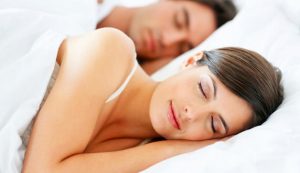Sleep plays an important role in your mental and physical health. While you are sleeping, your brain is working hard, forming the pathways for learning, and creating memories and thoughts. Without enough sleep or good quality of sleep, you have low concentration, focus and energy, and mood problems (just to name a few). Chronic lack of sleep can increase your risk of cardiovascular disease, infections, obesity, diabetes, and depression.
For most people today, sleep is a luxury. Everything is so fast-paced that 24 hours in a day sometimes feels too short to get all your tasks and activities completed, so you skip sleep, which only makes you feel worse and more stressed. Research suggests that adults need 7-9 hours of sleep each night to be well rested and have a body functioning at its best.
4 Common Signs That You Need More Sleep:
1. You are gaining weight
Lack of sleep can lead to an increased appetite (not the best food choices either). In addition, lack of sleep messes up your hormonal balance, making your body more likely to store any excess energy consumed as fatty tissue.
2. You are craving fatty and sugary foods
Being sleep-deprived leads to an increased production of cortisol, leading to the same physiological reaction – increased cravings for processed and fatty food. Lack of sleep also affects your decision-making skills as well as your ability to pick healthy food options.
3. It’s harder to focus
Sleep allows your brain to dispose of unnecessary waste of neural activity allowing it to function faster when you’re awake. Your memory and concentration does not function properly when you are sleep deprived.
4. You are moody
Ever heard of waking up on the wrong side of the bed? They’re often days when you had very little sleep. Eating sweets because you are sleep deprived can also contribute to an increase in your negative mood. Your body is under a lot of stress when you don’t allow your brain and body to regenerate during sleep. Feelings of stress, anger, sadness, and mental exhaustion can occur when you sleep less than 7 hours per night.
6 Natural Sleep Aids:
1. Food is medicine
Eating a heavy meal just before bed can cause you to have a poor night of sleep. Tryptophan and serotonin foods such as honey, whole grain gluten-free oats, brown rice, quinoa, turkey, nuts and seeds, may promote restorative sleep.
2. Calcium and Magnesium
Calcium levels are at their highest during our REM sleep. If you never get to the REM sleep phase or it’s limited, it could be related to a calcium deficiency. Calcium is important because it helps the brain create melatonin (natural sleep aid). Foods high in calcium are dark leafy greens (kale, broccoli, bok choy, okra), almonds, non-dairy milks (fortified), yogurt, and sardines (with bones). If you have trouble sleeping, it could be related to a magnesium deficiency. Higher levels of magnesium can help induce a deeper sleep and more consistent sleep since it is a calming nutrient, and when taken with calcium it increases better absorption together. Foods high in magnesium are spinach, swiss chard, pumpkin seeds, cacao, bananas, black beans, figs, and avocados. Taking a supplement with both calcium and magnesium is also beneficial.
3. Essential oils
Prescription medications for sleeping can cause awful side effects, making you feel not like yourself. Essential oils can help ease nerves, stress, anxiety, and promote sleeping. Bergamot, lavender, sandalwood, frankincense, and mandarin essential oils can create a sleep-inducing blend.
4. Valerian Root
Valerian is a plant with roots that contain many healing properties. It helps increase GABA, which helps calm the nerves in the brain and promotes a calming and sedative effect. There is valerian root and chamomile tea, and valerian root in capsule form.
5. St. John’s Wort
Depression and lack of sleep relate to one another. Insomnia and sleeping problems are common among those who are depressed. Chemicals, hyperforin and adhyperforin, are found in St. John’s wort, which act as little messengers in the brain that drive mood and work as power antidepressants. Using St. John’s Wort can help treat your depression and increase restful sleep.
6. Bedroom Atmosphere & No Technology
Don’t watch TV, work on the computer, or be on the cell phone while you are in your bed. The bright screen can lead to alertness. Also, keep your bedroom as a calming and sleeping sanctuary, with no electronics and only books, cold (temperature 60-69*F) and dark, and essential oils, which will promote calmness and sleepiness. The cold will help decrease your core body temperature and promote sleepiness.
Sleep is one of the most important factors of success and leading a healthy life.
Be sure to make sleep a top priority in your life.
References:
http://www.foodmatters.com/article/4-common-signs-that-you-need-more-sleep
http://draxe.com/natural-sleep-aids



